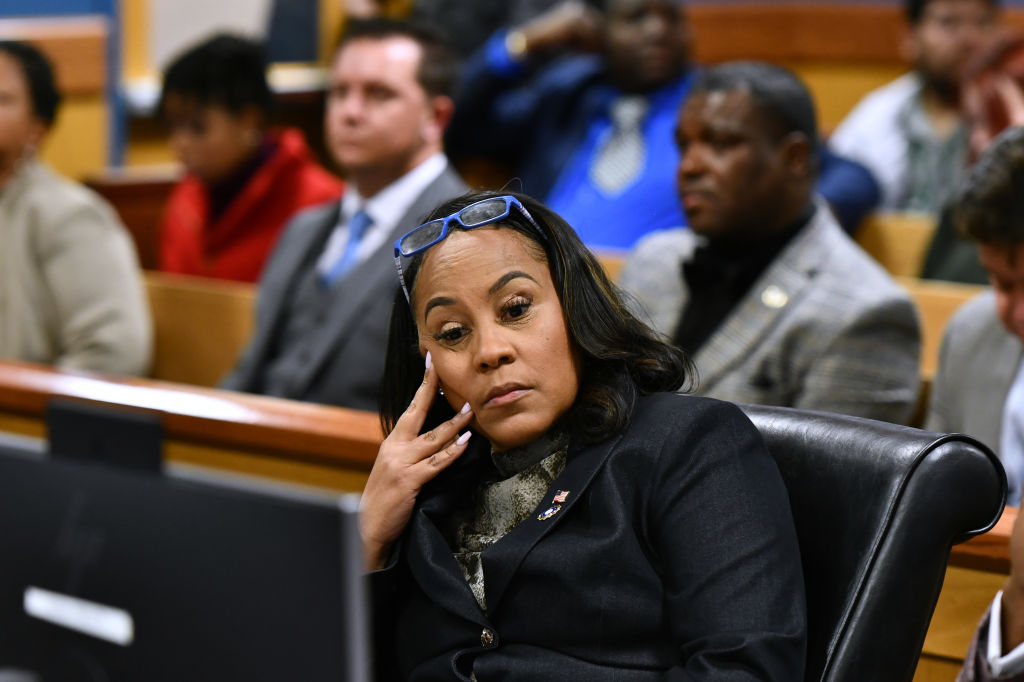Welcome back to The Collision. We apologize for missing last week, but Mike was nursing a reporting hangover after a long stretch in New Hampshire covering the primary there. We’re back in the ring again this week, though, looking at the mess that’s developed in recent weeks in Fulton County.
The Docket
- Last week, a jury in Manhattan decided that Donald Trump must pay writer E. Jean Carroll $83.3 million in damages after finding that the former president defamed her in 2019 after she alleged he had raped her in the 1990s. It’s the second civil verdict Trump has faced following Carroll’s claims. Last May, a separate jury found that Trump had sexually abused Carroll and awarded her damages after Trump defamed her in 2022. Trump said Tuesday he will appeal the verdict—and that he is looking for a new legal team to pursue that appeal.
- The verdict raises new questions about how Trump will pay for his legal defense. Nevada businessman and Republican donor Robert Bigelow told Reuters on Tuesday that he gave Trump $1 million “toward his legal fees” and pledged to give an additional $20 million to his super PAC. But the New York Times points out that it’s unclear where Bigelow’s $1 million donation actually went. Legally, it’s too large a donation to go to Save America, a pro-Trump PAC, or to Trump’s actual presidential campaign without running afoul of campaign finance laws.
- Relatedly, Politico reports that Trump’s political operation, spread out over five committees—including his campaign, supportive PACs, and a joint fundraising committee—spent more than it raised in 2023. Of the $210 million spent (compared to $200 million raised), $50 million appears to have gone toward covering Trump’s legal costs.
Catching Up on the Fani Willis Flap

Fulton County District Attorney Fani Willis has until tomorrow to formally respond to explosive allegations from one of Donald Trump’s co-defendants—allegations that threaten to upend the Georgia election-interference racketeering case.
But before we get into what could happen to this case, let’s back up and explain how we got here. In past editions of The Collision, we’ve noted in The Docket the Atlanta Journal Constitution’s excellent reporting since the lawyer for Republican operative Michael Roman filed a motion last month, but it’s worth going through it all in more detail.
On January 8, the AJC reported that Roman’s attorney, Ashleigh Merchant, alleged in a formal brief that Willis had hired a romantic partner as a “special prosecutor” to oversee the case, which is targeting Trump, Roman, and 17 others. The special prosecutor, Nathan Wade, paid for vacations with Willis with money his law firm received as a part of his compensation from Fulton County, the brief continued. Wade’s total compensation from the county since being hired in January 2022, according to the brief, is more than $1 million, though county records reviewed by the AJC document only a little more than $650,000 in payments.
The brief claims Willis failed to seek Fulton County’s approval, as required by state law, before appointing Wade special prosecutor on the racketeering case, and that Wade successfully sought to seal the proceedings of his ongoing divorce suit. The brief also suggests Wade is unqualified for the work Willis hired him to do, noting he had “never tried a felony RICO case.”
In summary, Merchant argued that both Willis and Wade should be disqualified from prosecuting the case “on the grounds that the district attorney and the special prosecutor have been engaged in an improper, clandestine personal relationship during the pendency of this case, which has resulted in the special prosecutor, and, in turn, the district attorney, profiting significantly from this prosecution at the expense of the taxpayers.” The motion also seeks to dismiss the entire case on the basis that Wade, who helped obtain the indictments, was doing so without any constitutional authority.
This is some heavy stuff, and it’s remarkable that Willis and the district attorney’s office has not yet filed a response as of publication. Pallavi Bailey, a spokeswoman for Willis’s office, did not respond to questions from The Dispatch about when the DA would respond or whether it would dispute any of the claims made by Roman’s attorney. Without any definitive evidence or admission of the facts, it’s unclear whether any of the allegations are true.
Willis made her first public remarks about the substance of the motion during an appearance at Big Bethel AME Church in Atlanta on January 14, several days after the filing brought the allegations into the open. She defended Wade (without mentioning his name) and his credentials for working on the Trump case, accused critics of focusing on Wade because he is black, and struck a generally defiant tone.
Meanwhile, Wade was expected to be asked about details of his relationship with Willis during a hearing in his divorce proceedings this week, but he quickly settled with his ex-wife on Tuesday, forestalling the need for him or Willis (who was also subpoenaed) to testify there. Also on Tuesday, Merchant filed a lawsuit claiming Willis’ office is withholding information requested under Georgia’s open-records law ahead of a hearing about the disqualification and dismissal motion on February 15. Judge Scott McAfee has ordered the DA’s office to respond by Friday.
The Dispatch has learned that Merchant has issued subpoenas to multiple witnesses for the February 15 hearing, including Willis and Wade. Among those who have been subpoenaed are two former colleagues of Wade’s, Christopher Campbell and Terrence Bradley, and a woman named Robin Bryant-Yeartie. The Washington Post first reported on the subpoenas for Campbell, Bradley and Bryant-Yeartie, describing the latter as a “longtime Willis associate.”
But Bryant-Yeartie’s occupation adds a clue as to what sort of testimony she may be able to provide. Bryant-Yeartie is the “founder and owner” of the travel agency Nibor World Travel, according to the company’s website. Merchant’s original brief cites “information obtained outside of court filings” that Willis and Wade traveled together on trips to “traditional vacation destinations” such as Napa Valley, Florida, and the Caribbean, and that Wade had purchased cruise tickets for himself and Willis.
Bryant-Yeartie did not respond to emailed questions or a voicemail message from The Dispatch.
What Could Happen Next
So where is this all going?
It’s possible Willis will claim all of the allegations made in Merchant’s brief are false and unfounded, and that she and Wade will both testify to that at the hearing—though if the claims were entirely specious, it’s odd that Willis’ office hasn’t quickly dispatched with it by filing their response. It’s possible that McAfee hears both sides and rules against Roman, allowing the case to proceed as it has been. Or McAfee could find in Roman’s favor entirely and dismiss the entire case. The facts will ultimately determine the likelihood of any of these outcomes, but lawyers in Georgia we’ve spoken to are skeptical the case will be dismissed entirely.
But consider the most disruptive option, which, if the allegations are largely true, is also the most likely: If McAfee determines Willis is disqualified from prosecuting the case without dismissing the case, things slow down considerably for Trump and his co-defendants.
Under Georgia law, when a district attorney is dismissed from a case, the authority to appoint a new prosecutor falls to the Prosecuting Attorneys Council of Georgia (PAC).
“Speaking in general terms, the process regarding appointment of a special prosecutor begins as soon as I am notified of a recusal,” Pete Skandalakis, the executive director of the agency, told The Dispatch over email. For that reason, Skandalakis said, he was unwilling and unable to comment on the specific case regarding Willis and the election RICO case if and until she is dismissed.
The law says the PAC can appoint another district attorney, a retired prosecutor, an attorney from the state’s Department of Law, an attorney from the council itself, or “a competent attorney.” There’s no provision determining a timeline for when a replacement attorney must be appointed, and it’s possible that process could take months or even years. In fact, we have an ongoing example to demonstrate how much of a delay this would cause.
In 2022, Willis was disqualified by a judge from continuing her election-interference investigation into Burt Jones, then a state senator and now Georgia’s Republican lieutenant governor, after she appeared at a fundraiser for a Democrat who eventually ran against Jones for lieutenant governor. Since then, the investigation has been in limbo. Last August, the PAC said it would appoint a special prosecutor to investigate Jones, but that appointment still hasn’t happened. In early January Skandalakis told the New York Times he was considering candidates but recognized he was in a “tough position” to select an attorney who could prosecute the highly politicized case.
Finding such a replacement in a case involving the former president and leading Republican candidate in 2024 would likely be even more difficult. Even if such a replacement could be appointed quickly, the new prosecutor would not be able to simply pick up where Willis left off.
“Once a prosecutor is appointed to any case, he/she has the responsibility to review all the evidence in the case, conduct further investigation into the matter, file additional charges, dismiss any charges and ultimately decide if the case should be prosecuted or not,” Skandalakis told The Dispatch.
So what this all could mean is a long, drawn-out delay mired in accusations of politicization no matter who is appointed and what happens. It would be the sort of mess Trump, who has been trying to delay all of his trials, had been hoping for.
Verbatim
“I absolutely trust the jury. And I think that they made their decision based on the evidence.”
—Nikki Haley, Trump’s last remaining rival for the GOP nomination, on Meet the Press on Sunday responding to the E. Jean Carroll verdict.







Please note that we at The Dispatch hold ourselves, our work, and our commenters to a higher standard than other places on the internet. We welcome comments that foster genuine debate or discussion—including comments critical of us or our work—but responses that include ad hominem attacks on fellow Dispatch members or are intended to stoke fear and anger may be moderated.
With your membership, you only have the ability to comment on The Morning Dispatch articles. Consider upgrading to join the conversation everywhere.